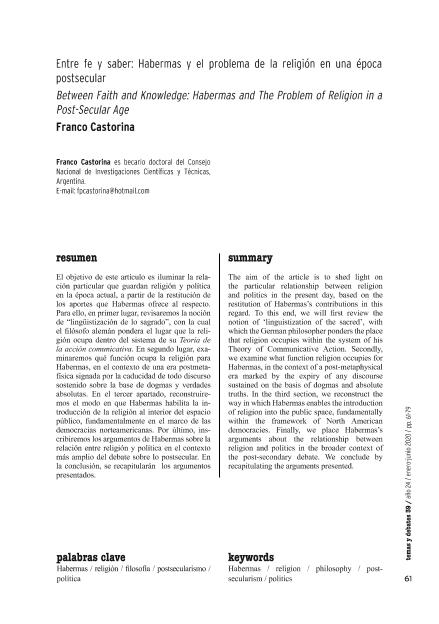Mostrar el registro sencillo del ítem
dc.contributor.author
Castorina, Franco Patricio

dc.date.available
2022-09-28T19:47:25Z
dc.date.issued
2020-06
dc.identifier.citation
Castorina, Franco Patricio; Entre fe y saber: Habermas y el problema de la religión en una época postsecular; Universidad Nacional de Rosario. Facultad de Ciencia Política y Relaciones Internacionales; Temas y Debates; 39; 6-2020; 61-79
dc.identifier.issn
1666-0714
dc.identifier.uri
http://hdl.handle.net/11336/170832
dc.description.abstract
El objetivo de este artículo es iluminar la relación particular que guardan religión y política en la época actual, a partir de la restitución de los aportes que Habermas ofrece al respecto. Para ello, en primer lugar, revisaremos la noción de “lingüistización de lo sagrado”, con la cual el filósofo alemán pondera el lugar que la religión ocupa dentro del sistema de su Teoría de la acción comunicativa. En segundo lugar, examinaremos qué función ocupa la religión para Habermas, en el contexto de una era postmetafísica signada por la caducidad de todo discurso sostenido sobre la base de dogmas y verdades absolutas. En el tercer apartado, reconstruiremos el modo en que Habermas habilita la introducción de la religión al interior del espacio público, fundamentalmente en el marco de las democracias norteamericanas. Por último, inscribiremos los argumentos de Habermas sobre la relación entre religión y política en el contexto más amplio del debate sobre lo postsecular. En la conclusión, se recapitularán los argumentos presentados.
dc.description.abstract
The aim of the article is to shed light on the particular relationship between religion and politics in the present day, based on the restitution of Habermas’s contributions in this regard. To this end, we will first review the notion of ‘linguistization of the sacred’, with which the German philosopher ponders the place that religion occupies within the system of his Theory of Communicative Action. Secondly, we examine what function religion occupies for Habermas, in the context of a post-metaphysical era marked by the expiry of any discourse sustained on the basis of dogmas and absolute truths. In the third section, we reconstruct the way in which Habermas enables the introduction of religion into the public space, fundamentally within the framework of North American democracies. Finally, we place Habermas’s arguments about the relationship between religion and politics in the broader context of the post-secondary debate. We conclude by recapitulating the arguments presented.
dc.format
application/pdf
dc.language.iso
spa
dc.publisher
Universidad Nacional de Rosario. Facultad de Ciencia Política y Relaciones Internacionales

dc.rights
info:eu-repo/semantics/openAccess
dc.rights.uri
https://creativecommons.org/licenses/by-sa/2.5/ar/
dc.subject
HABERMAS
dc.subject
RELIGIÓN
dc.subject
POSTSECULARISMO
dc.subject
POLÍTICA
dc.subject.classification
Otras Ciencia Política

dc.subject.classification
Ciencia Política

dc.subject.classification
CIENCIAS SOCIALES

dc.title
Entre fe y saber: Habermas y el problema de la religión en una época postsecular
dc.title
Between faith and knowledge: Habermas and the problem of religion in a post-secular age
dc.type
info:eu-repo/semantics/article
dc.type
info:ar-repo/semantics/artículo
dc.type
info:eu-repo/semantics/publishedVersion
dc.date.updated
2022-09-16T20:56:09Z
dc.identifier.eissn
1853-984X
dc.journal.number
39
dc.journal.pagination
61-79
dc.journal.pais
Argentina

dc.journal.ciudad
Rosario
dc.description.fil
Fil: Castorina, Franco Patricio. Consejo Nacional de Investigaciones Científicas y Técnicas; Argentina. Universidad de Buenos Aires. Facultad de Ciencias Sociales. Instituto de Investigaciones "Gino Germani"; Argentina
dc.journal.title
Temas y Debates
dc.relation.alternativeid
info:eu-repo/semantics/altIdentifier/url/https://temasydebates.unr.edu.ar/index.php/tyd/article/view/457
dc.relation.alternativeid
info:eu-repo/semantics/altIdentifier/doi/https://doi.org/10.35305/tyd.v0i39.457
Archivos asociados
